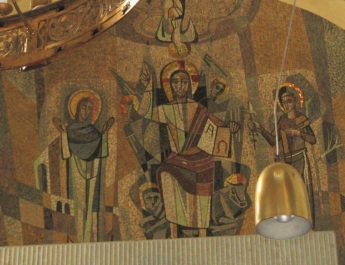Luke 3:21-23, 31-38
A Women’s Lectionary – Fourth Sunday after Epiphany A
21 NowA when allB the peopleC were baptized,D
A {untranslated} = ginomai. This is to come into being, to happen, become, be born. It can be to emerge from one state or condition to another or is coming into being with the sense of movement or growth.
B “all” = hapas. From hama (at once, together with) + pas (all, every, every kind of) OR from a (with) + pas (see above). This is all; every part working together as a unit.
C “people” = laos. This is the people or crowd – often used for the chosen people. This is where the word “laity” comes from.
D “baptized” = baptizo. From bapto (to dip or dye; to entirely cover with liquid, to stain). This is to submerge, wash, or immerse. Used specially for baptism.
and when JesusE also had been baptized and was praying,F the heavenG was opened,H
E “Jesus” = Iesous. From Hebrew Yehoshua (Joshua, the Lord is salvation); {from YHVH (proper name of the God of Israel; the self-existent and eternal one); {from havah (to become) or from hayah (to come to pass, become, be)} + yasha (to deliver, defend, help, preserve, rescue; properly, to be open, wide or free, which implies being safe. So, in a causative sense, this is to free someone)}. This is Jesus or Joshua in Greek – the Lord saves or the Lord is salvation.
F “praying” = proseuchomai. From pros (advantageous for, at, toward) + euchomai (to wish, make a request, pray). This is to pray or pray for, to worship or supplicate. It is more literally exchanging one’s own wishes for God’s.
G “heaven” = ouranos. May be related to oros (mountain, hill) with the notion of height. This is the air, the sky, the atmosphere, and heaven. It is the sky that is visible and the spiritual heaven where God dwells. Heaven implies happiness, power, and eternity.
H “opened” = anoigo. From ana (up, back, again, among, between, anew) + oigo (to open). This is to open in literal or figurative sense.
22 and the HolyI SpiritJ descendedK upon him in bodilyL formM like a dove.N
I “Holy” = hagios. From hagnos (holy, sacred, pure ethically, ritually, or ceremonially; prepared for worship, chaste, unadulterated, pure to the core; undefiled by sin; figurative for innocent, modest, perfect). God is totally different from humanity and thus set apart. That which is consecrated to worship God (elements of worship) or to serve God (as the saints) are holy because they are now set apart for God’s purposes. Holy because important to God. This is sacred physically, pure. It can be morally blameless or ceremonially consecrated.
J “Spirit” = pneuma. From pneo (to blow, breath, breathe hard). This is wind, breath, or ghost. A breeze or a blast or air, a breath. Figuratively used for a spirit, the human soul or part of us that is rational. It is also used supernaturally for angels, demons, God, and the Holy Spirit. This is where pneumonia comes from.
K “descended” = katabaino. From kata (down, against, throughout, among) + baino (to walk, go). This is to come down whether from the sky to the ground or from higher ground to lower. It can be used in a literal or figurative sense.
L “bodily” = somatikos. 2x in NT. From soma (body or flesh; body in a literal or figurative sense; the body of Christ); perhaps from sozo (to save, heal, rescue); from sos (safe, well, rescued). This is bodily or physical.
M “form” = eidos. 5x in NT– including “Spirit descended upon him in bodily form like a dove” in Luke 3:22, at the Transfiguration, “the appearance of his face changed” in Luke 9:29; also “we walk by faith, not by sight” in 2 Corinthians 5:7. From eido (to be aware, see, know, remember, appreciate). This is form, shape, sight, appearance.
N “dove” = peristera. 10x in NT. This is dove or pigeon.
And a voiceO cameP from heaven, “You are my Son,Q the Beloved;R with you I am well pleased.”S
O “voice” = phone. Probably from phemi (to declare, say, use contrasts in speaking to shed light on one point of view); {from phao (to shine) or phaino (to bring light, cause to appear, shine, become visible or clear). This is a voice, sound, tone or noise. It can also be a language or dialect.
P “came” = ginomai. Same as {untranslated} in v21. See note A above.
Q “Son” = huios. This is son, descendant – a son whether natural born or adopted. It can be used figuratively for other forms of kinship.
R “Beloved” = agapetos. From agape (love, goodwill, benevolence; God’s divine love); from agapao (to love, take pleasure in, esteem; to prefer). This is Beloved or very dear one. It is a title for the Messiah, but also for Christians. Properly, this is one who personally experiences God’s love.
S “am well pleased” = eudokeo. From eu (good, well, well done) + dokeo (to have an opinion, seem, appear, suppose; a personal judgment; to think); from dokos (opinion). This is to think well of, to be pleased or resolved. Properly, this is what someone finds good or acceptable – approving of some action or generally thinking well of.
23 Jesus was about thirtyT yearsU old when he beganV his work. He was the son (as was thought)W of JosephX son ofY Heli,Z
T “thirty” = triakonta. 11x in NT. From treis (three). This is thirty.
U “years” = etos. This is year or age.
V “began” = archomai. From archo (to rule, begin, have first rank or have political power). This is to begin or rule.
W “thought” = nomizo. 15x in NT. From nomos (what is assigned – usage, law, custom, principle; used for the law in general or of God’s law; sometimes used to refer to the first five books of the Bible or the entire Old Testament; also used to refer to theology or the practice and tradition of interpreting and implementing the law of God); from nemo (to parcel out, assign). This is to practice, think, consider, suppose, hold by custom. This is thinking that something applies given precedent and practice – to do by law.
X “Joseph” = Ioseph. From Hebrew Yoseph (he increases; Joseph); from yasaph (to add, increase, continue, exceed). This is Joseph, meaning “he increases.”
Y “son of” = ho. All of the “son of”s from this point forward are simple “of the” in Greek.
Z “Heli” = Eli. 1x in NT. From Hebrew Eli (Eli, “lofty”); from alah (to go up, ascend, be high, be a priority; to arise in a literal or figurative sense). This is Heli or Eli – name meaning “lofty” or “God is High.” See https://www.abarim-publications.com/Meaning/Eli.html
31 son of Melea,AA son of Menna,BB son of Mattatha,CC son of Nathan,DD son of David,EE
AA “Melea” = Melea. 1x in NT. Perhaps from Hebrew male (to be full). This is Melea or Meleas, which may mean “fullness” or “fulfillment.” See https://www.abarim-publications.com/Meaning/Melea.html
BB “Menna” = Mainan. 1x in NT. From Hebrew Menna (Menna). This is Mainan or Menna – meaning uncertain.
CC “Mattatha” = Mattatha. Related to “Jesus” in v21. 1x in NT. A shortened form of Mattathias (Mattathias, a name meaning “gift of the Lord”); from Hebrew Mattithyah (Mattithiah, a name meaning “gift of the Lord); {from mattath (a gift or reward); {from mattan (a gift or present); from natan (to give, appoint, assign, be healed, put, add)} + Yah (the shortened form of the name of the God of Israel; God, Lord); {from YHVH (see note E above)}. This is Mattatha, a name meaning “gift of the Lord.”
DD “Nathan” = Natham. Related to “Mattatha” in v31. 1x in NT. From Hebrew Nathan (Nathan, meaning “given” or “[God] given”); from natan (see note CC above). This is Natham or Nathan, meaning “given” or “[God] given.”
EE “David” = Dauid. From Hebrew David (David); from the same as dod (beloved, love, uncle); the root may mean to boil, which is used figuratively to describe love. So, this implies someone you love such as a friend, a lover, or a close family member like an uncle. David’s name likely means something like “beloved one.”
32 son of Jesse,FF son of Obed,GG son of Boaz,HH son of Sala,II son of Nahshon,JJ
FF “Jesse” = Iessai. 5x in NT. From Hebrew yishay (Jesse); perhaps from the same as yesh (being, existence, substance). This is Jesse, perhaps meaning “God exists.” See https://en.wiktionary.org/wiki/%D7%99%D7%A9%D7%99#Hebrew
GG “Obed” = Obed. 3x in NT. From Hebrew Obed (Obed, “worshiper,” “serving,” “servant,” “slave); from abad (to work, serve, compel; any kind of work; used causatively, can mean to enslave or keep in bondage) + Edom (Edom or Idumaea); {from adom (to be red or flushed)}. This is Obed, a name meaning “worshiper” or “serving” or “servant” or “slave.” See https://www.abarim-publications.com/Meaning/Obed.html
HH “Boaz” = Boos. 3x in NT. From Hebrew Boaz (Boaz, “quickness”; also a pillar of the temple). This is Boaz, a name meaning “quickness.”
II “Sala” = Sala. 2x in NT. From Hebrew Shelach (Shelah, Shalch, or Salah; “sent out” or “branch” or “javelin” or “request”); from shalach (to send, send for, forsake, give a slave freedom) OR from the same as shelach (a weapon, spear, defense, plant, shoot, branch, missile); from shalach (see above). This is Sala or Shelah, a name meaning “sent out” or “branch” or “javelin” or “request.” See https://www.abarim-publications.com/Meaning/Shelah.html
JJ “Nahshon” = Naasson. 3x in NT. From Hebrew Nachshon (Nachshon, meaning “enchanter”); from the same as nachash (to practice divination, learn by experience; to hiss as in whispering a spell). This is Nahshon or Naasson, meaning “enchanter.”
33 son of Amminadab,KK son of Admin,LL son of Arni,MM son of Hezron,NN son of Perez,OO son of Judah,PP
KK “Amminadab” = Aminadab. 3x in NT. From Hebrew amminadab (Ammniadab, meaning “my kin is noble”); {from im (with, alike, near); {from amam (to darken, associate, hide)} + nadib (noble, generous, willing, voluntary); {from nadab (to offer willingly, volunteer)}}. This is Amminadab, meaning “my kin is noble.
LL “Admin” = Aram. 4x in NT. From Hebrew ram (Ram, meaning “high”); from rum (rise, bring up, being high, extol, exalt, haughty; to raise in a literal or figurative sense). Ram or Aram, a name meaning “high.”
MM “Arni” = Aram. Same as “Admin” in v33. See note LL above.
NN “Hezron” = Hesrom. 3x in NT. From Hebrew chetsron (Hezron; person and a place); from the same as chatser (village, settlement). This is Hezron or Esrom, meaning “village.”
OO “Perez” = Phares. 3x in NT. From Hebrew perets (a breach or a gap; a break, literal or figurative); from parats (to make a breach, burst out, compel, disperse; to break out literally or figuratively). This is Perez, meaning “breach.”
PP “Judah” = Iouda. 8x in NT. From Hebrew Yehudah (Judah, son of Jacob, his tribal descendants, a name for the southern kingdom. Literally, it means praised); probably from yadah (to throw one’s hands into the air in a gesture of praise); from yad (hand). This is Judah or Judas, meaning praised.
34 son of Jacob,QQ son of Isaac,RR son of Abraham,SS son of Terah,TT son of Nahor,UU
QQ “Jacob” = Iakob. From Hebrew Yaaqov (Jacob); from the same as aqeb (heel, hind part, hoof, rear guard of an army, one who lies in wait, usurper). This is James, meaning heel grabber or usurper.
RR “Isaac” = Isaak. From Hebrew yitschaq (Isaac, “he laughs”); from tsachaq (to laugh, mock, play, make sport; this is laughing out loud whether in joy or in a scornful way). Isaac, meaning “he laughs.”
SS “Abraham” = Abraam. Related to “Admin” in v33. From Hebrew Abraham (exalted father); from the same as Abiram (exalted father, a high father – lofty) {from ab (father literal or figurative) + rum (see note LL above)}. This is Abraham, father of many nations or father of a multitude.
TT “Terah” = Thara. 1x in NT. From Hebrew Terach (Terah, Terach; perhaps “delay” or “wanderer” or “global spirit”); perhaps from tarah (to turn, wander) OR from tor (dove) + ruach (breath, wind, air, cool, spirit; wind, which resembles the breath; figuratively, life itself or being frail/mortal/impermanent; air of the sky or the spirit). This is Terah or Thara, perhaps meaning “delay” or “wanderer” or global spirit.” See https://www.abarim-publications.com/Meaning/Terah.html#.X2Tov2hKhPY
UU “Nahor” = Nachor. 1x in NT. From Hebrew Nachor (Nachor or Nahor, “snorer”). This is Nahor, meaning “snorer.”
35 son of Serug,VV son of Reu,WW son of Peleg,XX son of Eber,YY son of Shelah,ZZ
VV “Serug” = Sarouch. 1x in NT. From Hebrew Serug (Serug; “tendril”); from sarag (to twine together, wrap). This is Serug or Saruch, meaning “tendril.”
WW “Reu” = Rhagau. 1x in NT. From Hebrew R’uw (Reu; “friend”); from rei (pasture, pasture fed); from raah (to graze, tend a flock, keep company with; to pasture in a literal or figurative sense). This is Reu or Ragau, meaning “friend.”
XX “Peleg” = Phalek.1x in NT. From Hebrew Peleg (Peleg, “earthquake” or “division”); from palag (to split or divide in a literal or figurative sense; to confound). This is Peleg or Pahlek, meaning “earthquake” or “division.”
YY “Eber” = Eber. 1x in NT. From Hebrew Eber (Eber, “region beyond”); from the same as eber (the region beyond, passage, quarter, opposite side; generally the east); from abar (to pass over, pass through, or pass by; cross over or to alienate; used for transitions). This is Eber or Heber, meaning “region beyond.”
ZZ “Shelah” = Sala. Same as “Sala” in v32. See note II above.
36 son of Cainan,AAA son of Arphaxad,BBB son of Shem,CCC son of Noah,DDD son of Lamech,EEE
AAA “Cainan” = Kainam. 2x in NT. From Hebrew Qenan (Qenan, Kenan, or Cainan, “fixed”); from the same as qayin (spear); {from qun (to chant a lament, to play a musical note)} OR from the same as qen (a nest, room, dwelling, nestlings); {from qaanan (to nest, nestle – to make or be in a nest)}. This is Cainan or Kenan, meaning “fixed.”
BBB “Arphaxad” = Arphaxad. 1x in NT. From Hebrew Arpakshad (Arpachshad – a name of foreign origin, meaning unclear). This is Arphaxad, a name of foreign origin whose meaning is not clear.
CCC “Shem” = Sem. 1x in NT. From Hebrew Shem (Shem, meaning “name”); from the same as shem (name, fame, renown; indicates something essential about a person –about their individuality; can also mean honor, authority, or character); perhaps from sum (to put, place, set). This is Shem, meaning “name.”
DDD “Noah” = Noe. 8x in NT. From Hebrew nuach (to rest, calm, camp, free, place, remain, satisfy, settle, station, or wait; implies settling down in a literal or figurative sense). This is Noah, meaning “rest.”
EEE “Lamech” = Lamech. 1x in NT. From Hebrew Lemek (Lamech, meaning “for lowering” or “for humiliation” or “strong man”); perhaps from l- (to, for, of) + muk or makak (be low, humiliate, go down) OR from an unknown root meaning to be robust. This is Lamech, meaning “for lowering” or “for humiliation” or “strong man.” See https://www.abarim-publications.com/Meaning/Lamech.html
37 son of Methuselah,FFF son of Enoch,GGG son of Jared,HHH son of Mahalaleel,III son of Cainan,
FFF “Methuselah” = Mathousala. Related to “Sala” in v32. 1x in NT. From Hebrew Methushelach (Methuselah, perhaps meaning “man of the dart); {perhaps from math (a man, associate, friend, number; an adult or mortal); {from mathay (when, how, length of time)} + shelach (see note II above}}. This is Methuselah, perhaps meaning “man of the dart.”
GGG “Enoch” = Enoch. 3x in NT. From Hebrew Chanok (Enoch, Hanoch, likely means “initiated); from the same as chek (chamber or room that is private; can mean the innermost chamber of a house); probably from chanak (to narrow; to dedicate, initiate, train, or discipline). This is Enoch, perhaps meaning “initiated.”
HHH “Jared” = Iaret. 1x in NT. From Hebrew Yered (Jared, Jered, Yered, a name meaning “descent”); from yarad (to go down, descend; going down in a literal or figurative sense; going to the shore or a boundary, bringing down an enemy). This is Jared, meaning “descent.”
III “Mahalaleel” = Maleleel. 1x in NT. From Hebrew Mahalalel (Mahalalel; “praise of God”); from mahalal (praise, fame); {from halal (to praise, be boastful)} + el (God, a god). This is Mahalaleel or Maleleel, meaning “praise of God.”
38 son of Enos,JJJ son of Seth,KKK son of Adam,LLL son of God.MMM
JJJ “Enos” = Enos. 1x in NT. From Hebrew Enosh (Enosh, meaning “man”); perhaps from enosh (human, humankind, mortal); from anash (to be weak, sick, or frail). This is Enos or Enosh, meaning “man.”
KKK “Seth” = Seth. 1x in NT. From Hebrew Sheth (Seth, Sheth, meaning “put” or “substituted); from shith (to place, set, bring, appoint, consider, bring, array or look). This is Seth or Sheth, meaning “put” or “substituted.”
LLL “Adam” = Adam. 9x in NT. From Hebrew Adam (Adam); from the same as adam (human, humankind, ruddy); from adam (to be red, red in the face). This is Adam.
MMM “God” = Theos. From Proto-Indo-European origins, meaning do, put, place. This is God or a god in general.
Image credit: “Baptism of Jesus” at Iona Abbey cloister. Photo by Jim Forest, 2012.




